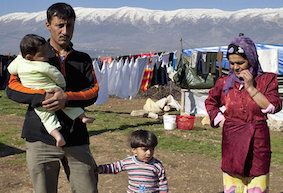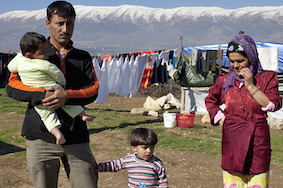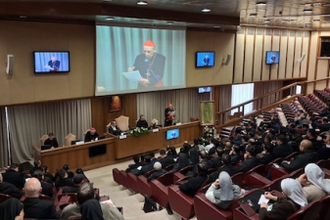Nationality and Borders Bill: What are the facts?

Syrian refugee family - image Vatican News
People may wonder why yet more legislation is needed. In its most recent update, Seeking Sanctuary has set out facts and figures to counter many of the misleading claims made to justify the need for yet another Bill.
If you flee persecution and want the protection of the UK government, you must must reach UK soil and apply to the Home Office for recognition as a refugee. Traditionally around two-thirds of these applications are refused, although in 2019 and 2020, around half of the applicants were granted refugee status or another form of legal protection at the first time of asking. Many of these decisions are wrong: thousands of appeals are allowed every year, amounting to 49% in 2020/21.
Combining initial grants of asylum with the successful appeals, a clear majority of asylum seekers become recognised refugees or get a similar status. The Home Office's own figure for 2019 is 64%.
The right to seek asylum is universal and does not depend upon how people travel.
Our government's proposals set out to undermine the refugee convention and categorise people as 'inadmissible' if they reach Britain by irregular means or have passed through third countries, despite the fact that more than half of them are likely to have valid reasons for claiming asylum.
In 2020, almost 30,000 people applied for asylum (not including dependent family members). This is well below the 2019 level despite the increased number arriving across the Channel by boat. In fact these do not form an extra new flow, but rather represent people who have diverted from crossings in vehicles. Getting on for half of these - 46% - were from five countries: Iran, Albania, Eritrea, Iraq and Sudan, whilst other significant contributors include Afghanistan, Vietnam, Pakistan and Syria. None noted as territories of peace and safety.
The UK's share of the world's refugees is light. The World Bank put the number of refugees in the UK in 2018 at around 127,000, or 0.5% of the world's total. Even by UK standards, the number of asylum seekers today is not particularly high. Numbers peaked around the turn of the century, reaching over 100,000 during 2002, if dependants are included, and have been fairly steady recently, averaging 39,000 over the past five years.
The cost of food and shelter for asylum seekers has not risen because more applications are being made, but because they are not dealt with efficiently. The number waiting for more than a year for an initial decision increased almost tenfold from 3,588 people in 2010 to 33,016 in 2020. Within this total, the number of children waiting longer than a year increased more than twelve-fold from 563 children in 2010 to 6,887 in 2020.
What is needed is a system that works by making timely decisions and ensures that everybody in need of safety gets a fair hearing.
Some refugees are 'resettled', i.e., brought directly to the UK. Politicians like to stress that resettlement is good and coming to the UK under your own steam ("jumping the queue") is bad. There are said to be 26 million refugees worldwide, while over the past five years, the UK has resettled around 26 thousand - 0.1%. No-one can apply directly for resettlement in the UK, but instead they must wait in camps near their places of origin and hope to one day be pulled out of the pile by UN agents and assigned to a resettlement programme (not in a country of their choice).
There is, in fact, no queue to join! Despite the announcement of a new UK resettlement programme for about 5,000 people a year in 2019, hardly anyone has been resettled since the Covid pandemic began.
Bishops Paul McAleenan and William Nolan have pointed out the need to write to Parliamentarians to point out defects in the new Bill, using the excellent briefings provided by agencies such as the Jesuit Refugee Service and the SVP, who have first hand experience of encounters with those who will be directly affected if all its proposals become law.
With the Bill's second reading over, we still need to write and ask for concerns to be passed on to those involved in the Bill's Committee stage and to Home Office ministers.
Follow us on Twitter'Seeking Sanctuary' aims to raise awareness about people displaced from their homes and to channel basic humanitarian assistance from Faith Communities and Community Organisations via partnerships with experienced aid workers. Our special concern is for the 2000 or so exiles who are stuck in north-western France, mistakenly expecting a welcome in the UK.
They need food, water, good counsel and clothes, which are accepted, sorted and distributed by several organisations, including two Calais warehouses which also supply needs further afield.
For more information see: www.seekingsanctuary.weebly.com


















